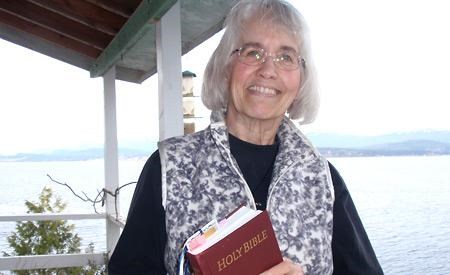by Sandy McCormick As a young child, Karen May, 66, knew she wanted to help others. Growing up in Vancouver, in what the Texada Islander describes as a “Victorian” family, she was funnelled along with other girls of the day to be “a home-maker, a teacher or a nurse.” But she also grew up in an era consumed with “women’s liberation and the protest movement,” so she was determined to find her own way to fulfillment.
Now, the one-time midwife and physical and occupational therapist is Texada’s church minister and knows she is doing what she was meant to do. Trained through the United Church of Canada’s lay ministry program, she officiates at the island’s only church, the small United Church in Van Anda. “My job is half-time, but otherwise the same as an ordained minister without having to spend four years away at theological school.” As minister, May conducts Sunday services, Bible studies, does sacraments, makes home and hospital visits and always tries to “put something of myself into every sermon.”
“I’ve always been a spiritual seeker,” said May. Her parents were not religious, so as a youth she went to every church she could get to. On her own, she attended faith workshops, consciousness-raising groups and read about Buddhism and Hinduism. “To me, it was about what is right and good, about justice and about truth.” But as she learned more about church hierarchy, she saw few opportunities for women within it at the time, so as a teenager she left.
After high school she was accepted by the University of BC in both nursing and rehabilitation medicine. She chose the latter and graduated in 1970 as a physical and occupational therapist. May also took midwifery training in England and completed a two-year certification in Healing Touch therapy. She worked as an occupational therapist in Coquitlam and Mission, where she especially enjoyed developing programs for seniors.
In Mission, she met her husband Clarence Wood, a museum curator who formerly stewarded the historical collections in Barkerville. On his 50-foot sailboat, they cruised the Strait of Georgia and were attracted to Powell River as a community where May could have a clinic and they could live by the sea. They moved in 1994, when May established Powell River Physiotherapy, which operated until 2008.
Because of complications in Powell River with moorage space for Wood’s boat, they moved in 1997 to Texada Island, where space was available. They bought an oceanfront home in Van Anda, where May says “I felt spiritual just being there. It was back-to-nature, surrounded by the trees, the water and the stars at night.” She began reading Christian literature again and was attracted to “the cute little church down the road,” which she joined in 2002.
Soon active in church life, May was part of a congregational search committee when the long-time minister retired. As one hiring option, the committee considered a “lay” minister, something May had never heard of. “I went home and thought about the criteria for becoming a lay minister and a little voice in the back of my head said ‘you can do this.’ So I resigned from the committee and applied for the job.”
She went through a United Church “discernment process” with congregation members from Texada and Powell River and was accepted into the church’s lay ministry program. Her training was on-the-job at the church in Van Anda, reading, interviews and six weeks over three years at the United Theological College in Montreal. There, she considered the formation of faith and spirituality, experienced intensive self-examination, evaluated her own belief system and learned the doctrines of the United Church. Upon completion, she was recognized by the church as a lay minister.
“Service is my calling,” May said, “whether it’s helping people with health issues or being called to be the voice of God.” But she says it’s also important to be involved in the community as a “regular” person and, as such, serves as a director of the Van Anda Improvement District and the Texada Arts, Culture and Tourism Society. She also enjoys yoga and folk-dancing.
In 2008, May began a popular Texada program for youth called Kids for Saving Earth (KSE), modelled after similar programs in the United States. “The idea was to create a type of eco-camp to engage youth with positive summer experiences.” KSE is free for 30 participants each summer and has “had tremendous support from the community in sharing the wisdom of elders and integrating the generations.” The 2013 one-week day-camp lineup tentatively includes emergency preparedness, a dance workshop, art from things found in nature, swimming and a community service cleanup at Shelter Point Park, complete with ice cream.



